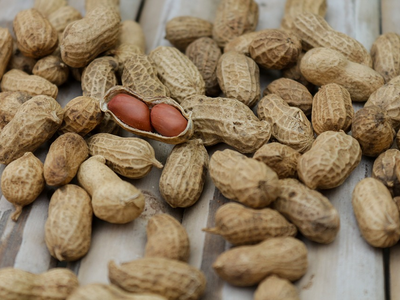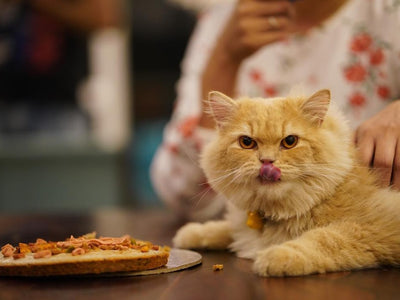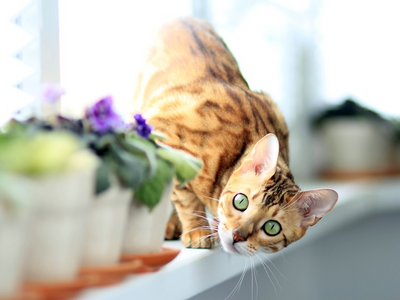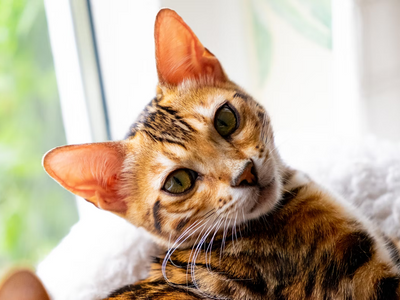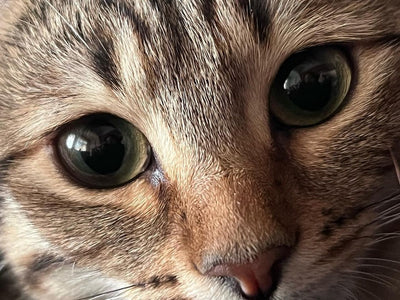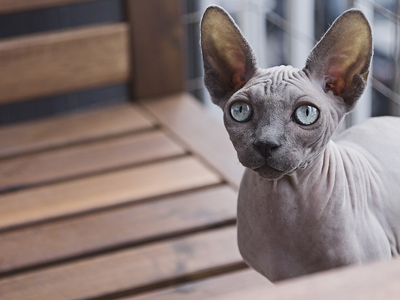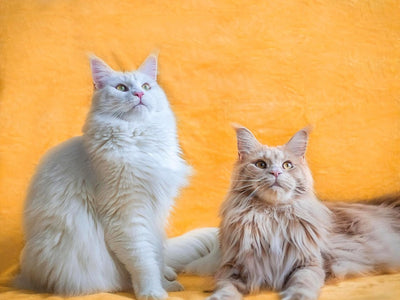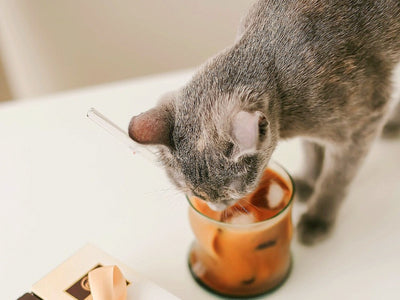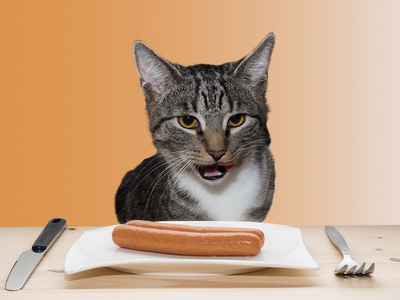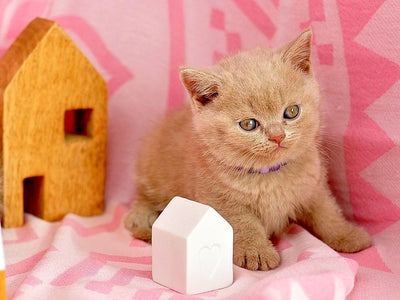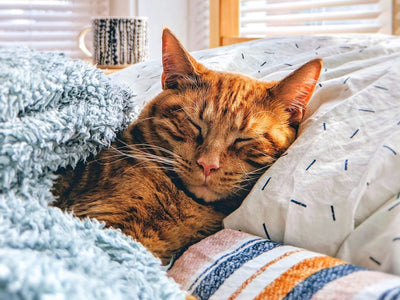16.03.2022
Can cats eat carrots? Learn all about cats and carrots here
Carrots are a fantastic source of vitamin A for humans and have numerous health benefits as they are known to promote eye health and improve blood sugar levels. But can cats eat carrots, and will they benefit from this root vegetable as much as humans do? Untamed is here to give you the answer. We will also explain the ins and outs of a proper cat diet and tell you all about the cat food that caters to your feline's nutritional needs.
What’s in a carrot?
This vegetable is high in zinc, fibre, folate, vitamin K1 and E, manganese, magnesium, potassium, phosphorus, and beta-carotene that converts into vitamin A. Check out the table below to see which macronutrients this root vegetable contains:
|
Macronutrients |
Amount in 100 grams |
|
Calories |
41 |
|
Water |
88% |
|
Protein |
0.9 grams |
|
Carbs |
9.6 grams |
|
Sugar |
4.7 grams |
|
Fibre |
2.8 grams |
|
Fat |
0.2 grams |
Can cats eat carrots?

While carrots are a healthy snack for humans, cats don’t benefit much from this vegetable.
Source: Jeremy Bezanger
Cats need vitamins A, K, D, E, and B12 and minerals, such as iron, calcium, chloride, potassium, and magnesium to thrive, and they get these vitamins and minerals out of their standard high-protein wet food. Since carrots are rich in vitamins K, A, and E, potassium, and magnesium, you might think they’re a suitable treat for kitties. Even though carrots are safe for cats (when fed in small quantities), they aren’t the best food choice for our feline companions as cats cannot absorb nutrients from plants. As obligate carnivores, cats are biologically predisposed to absorb nutrients from meat only.
How to serve carrots to cats safely
If your cat is a carrot lover, you can feed them carrots occasionally as a treat. Here’s how to keep your kitty safe when serving this vegetable:
- Wash the carrots thoroughly
- Peel the skin
- Cook carrots in unseasoned water until they are soft
- Make sure they cool down before serving
Cats shouldn’t eat raw carrots as they present a choking hazard and are difficult to digest.
If you’re introducing carrots as new food, keep an eye on your furball because they can experience:
- Gastrointestinal issues (diarrhoea, constipation, vomiting)
- Allergic reactions
How much carrot is too much?
Carbs shouldn’t exceed 3% of your kitty’s daily food intake. If your cat is crazy about carrots, you can serve them sparingly once every few weeks and no more than 5 grams a day.
Even though carrots are low-calorie food for humans, feeding carrots to your kitty often can lead to obesity and, eventually, diabetes. The symptoms of diabetes include:
- Appetite loss
- Constant urination
- Excessive thirst
- Lethargy
- Vomiting
Are carrots safe for kittens?
Before they start weaning, kittens must either drink their mother’s milk or be given a milk replacer formula (KMR). Kittens can start eating solid food at around three weeks of age when their teeth first appear.
For their proper development, kittens need a high-calorie diet. They have sensitive tummies, so you need to be careful about what you feed them and in what amounts. Kittens need moisture, animal protein, fat, vitamins, and minerals in their diet. Since they get these nutrients from high-quality wet food that contains whole meat, carrot is off the table because it doesn’t provide the nutrients kittens need to thrive.

I want my mummy, not carrots!
Source: Vadim B
What is the ideal diet for cats?
If you want your kitty to be happy and healthy, you need to make sure that their diet is appropriate. Here are the nutrients essential to your feline companion:
- Animal protein
- Animal fat
- Vitamins and minerals
Animal protein
As cats need at least 50% of animal protein in their diet, the best food for them is lean meat and fish. Cats can’t process plant proteins or absorb any nutrients from fruits and vegetables. They might occasionally eat grass because it helps with digestion, but other than that, plants should be avoided altogether.
Animal protein contains essential amino acids, like taurine and arginine, necessary for:
- Muscle development
- Energy
- Skin and fur health
- Organ health
Check out the most common animal protein sources and their bioavailability:
|
Protein source |
Bioavailability index |
|
98% |
|
|
94% |
|
92% |
Many manufacturers use meat derivatives in their products to save money. Since meat byproducts don’t provide the nutrients cats need in their diet, avoid cat food that contains them.
Animal fat
Animal fat is a delicacy for kitties because it makes the food taste great, but it also contains the essential fatty acids, such as:
- Arachidonic acid
- Linoleic acid
- Omega-3 and omega-6
These fatty acids are super important for maintaining healthy skin and a lustrous coat.
Keep in mind that your furry companion’s diet should contain no more than 20% of fat because overconsumption leads to obesity.
Vitamins and minerals
Cats can synthesise only vitamins C and K by themselves, so they must get other necessary vitamins and minerals from food.
All essential macro and micronutrients are available in meat and fish, so you don’t have to add carrots or other vegetables, fruits, or grains to your feline’s meals.

Chicken and liver have everything your kitty needs to be happy and healthy!
Image (c) Untamed
How to choose the best food for your cat
Now that you know what nutrients your kitty needs to thrive, it’s time to choose high-quality food for them. Typically, you can find the following two types of food on the market:
- Dry cat food
- Wet food
Dry cat food
Many cat parents base their feline companions’ meal plans on cat biscuits because it is the most affordable option. While budget-friendly and easy to store and serve, cat kibble isn’t the best choice, as it is heavily processed and doesn't contain all the necessary nutrients.
Another drawback is that dry food doesn’t have enough moisture, so basing your cat’s diet solely on kibble may result in dehydration. In the long run, dehydration can cause serious health issues, such as cystitis, struvite crystals, kidney disease, and irritable bowel syndrome.
Wet food
Wet food is close to cats’ natural feeding pattern, i.e. what they would eat in the wild. High-protein wet food should be the basis of your cat’s meal plan because it contains enough moisture, protein, and fat.
Wet food is a much better option than cat kibble because it:
- Helps cats maintain healthy digestion and a strong immune response
- Is low in carbs and high in protein
- Has enough moisture to keep your feline companion hydrated
It is recommended that you feed your furry friend wet food twice a day and adjust portions to their weight and activity levels.
Some cats who have been fed only dry food for too long might not want to switch to wet food. The solution to this problem is to mix dry food with wet food, increasing the amount of wet food with each meal until your cat gets used to the taste and texture.
You should also warm their meals slightly before serving. To enhance the aroma and make the mixture more enticing, you can add bone broth or meat soup. That way, your furry friend will get enough moisture and nutrients while enjoying the taste.

Even the fussiest eaters love Untamed wet food!
Image (c) Untamed
Add Untamed to your kitty’s menu and watch them thrive
It’s difficult to find food that satisfies cats' nutritional needs because most manufacturers use iffy meat derivatives and plant-based ingredients as fillers to save money. Untamed never compromises on quality!
Being cat parents ourselves, we know how important high-quality food is for our feline companions’ overall health. Untamed meals are:
- High in protein—Untamed food contains twice as much protein as the industry standard
- Vet-formulated—We collaborated with vets to create recipes that satisfy cats’ unique biological needs
- Made with whole meat—We use only quality premium cuts of human-grade meat
- Ethically sourced—Untamed uses ingredients that come from sustainable sources, our packaging is 100% recyclable, and our operations leave a neutral carbon footprint
- Irresistible—Our savoury dishes will please even the pickiest eaters because Untamed doesn’t compromise on taste. Once your cat tries our jelly and gravy recipes, they will ask for more!
- Gently cooked—Heavy processing of cat food destroys nutrients and aroma, which is why many manufacturers use artificial colourings and flavouring in their food. This is not the case with Untamed—we gently simmer our food to preserve the aroma and bioavailability of ingredients
Untamed hypoallergenic dishes are perfect for cats of any age—from kittens to adult and senior felines. Our food satisfies the nutritional needs of all breeds, including Persians, Siamese, Bengals, Ragdolls, Maine Coons, and British Shorthairs.
Cat parents’ experience with Untamed
You will notice the difference in your kitty’s health once you switch to Untamed. Here’s what changes cat parents who decided to try our products have noticed:
|
Timeline |
Changes |
|
One week |
|
|
Two months |
|
|
Four months |
|
|
Six months and beyond |
|
To treat your cat to Untamed delicacies, take our TRY NOW quiz and order your first meal box in a few clicks.
How to join the Untamed family
Untamed enables easy online ordering of cat food that ensures your full comfort. To order according to your kitty's taste, follow these steps:
- Visit our Try Now page and complete the questionnaire
- Review the meal plan
- Confirm your order
We’ll deliver your tailor-made meal box within a day without shipping fees. If your feline friend likes Untamed, we’ll send you a delicious cat food box each month around the same time.
You can modify, pause, or cancel your order at any time.

I’m dreaming of chickens, not carrots!
Source: KAVOWO
Other feline-friendly veggie snacks
Some cats like vegetables, so if your kitty is one of them, you can safely feed them the following veggies:
- Pumpkin
- Squash
- Peas
- Cucumber
- Broccoli (cooked)
- Asparagus (cooked)
- Green beans (cooked)
- Green bell peppers (cooked)
- Brussels sprouts (cooked)
- Zucchini
- Celery
Spinach is also safe for cats, but you must not feed it to your furry friend if they have urinary infections or kidney problems.
What about fruit?
Since cats can’t taste sweet as humans do, they probably won’t show any particular interest in fruits. In case your feline tries to steal a bite of your fruit salad, it’s likely because they’re curious. Check out which fruits you can share with your kitty:
- Apricots
- Apples
- Bananas
- Cantaloupes
- Cranberries
- Blueberries
- Strawberries
- Seedless watermelons
While fruit is fine as an occasional treat, it’s usually packed with sugar, so you shouldn’t make a habit of feeding it to your furry friend.
Vegetables and fruits cats should never eat
Some fruits and vegetables are highly toxic to cats, so you should never give them to your furry friend. Avoid the following at all costs:
- Allium vegetables—Onions, garlic, chives, and shallots attack red blood cells in felines, quickly leading to anaemia and kidney failure
- Citrus fruits—Citric acid in citrus fruits such as lemons, limes, clementines, grapefruits, and oranges can cause kidney failure. Some cats may suffer skin irritation after touching these fruits
- Grapes—Grapes and raisins, even in the tiniest amounts, can lead to digestive issues with symptoms like vomiting and diarrhoea. If your cat consumes grapes regularly, they will experience kidney failure
Other foods that are toxic to kitties
Some human food items can be highly toxic to cats, and even the tiniest amounts can cause serious health issues that can have a lethal outcome. Take your cat to the vet if they consume any of the following:
- Alcohol
- Chocolate
- Coffee
- Xylitol
- Raw dough and yeast
Alcohol
Any food containing alcohol can cause:
- Vomiting
- Diarrhoea
- Disorientation
- Breathing difficulties
- Depression
- Coma
- Death
Chocolate
Chocolate contains caffeine and theobromine, and these substances can cause vomiting, diarrhoea, abdominal pain, restlessness, appetite loss, fever, tremors, and seizures. The most damaging is dark chocolate because it’s high in cocoa.
Feeding your cat chocolate regularly can also lead to diabetes and dental issues.
Coffee
Similarly to chocolate, coffee contains methylxanthine caffeine, and it can lead to hyperactivity, seizures, tremors, and increased thirst. If consumed in large amounts, coffee can be lethal to your feline friend.
Xylitol
Xylitol is an artificial sweetener that can be found in jelly, toothpaste, chewing gum, and peanut butter. Make sure to keep these products away from your kitty because xylitol poisoning will result in vomiting, lethargy, and eventually liver failure.
Raw dough and yeast
When baking, keep your kitty out of the kitchen. If they accidentally consume raw dough, the yeast could start fermenting in their tummy and turn into alcohol. It will cause severe alcohol poisoning, leading to central nervous system damage and coma.
Consuming raw dough can also result in digestion problems that manifest as vomiting and diarrhoea.
Products that aren’t toxic but are harmful to cats
While not toxic, some food items can be harmful to cats. Here’s which food to avoid and why:
Dairy products
Because of the cartoons and other pop culture references, you might believe that milk is safe for cats or even healthy. This isn’t true. Most cats are lactose intolerant, which means that they won’t be able to process dairy products like milk, yoghurt, and cheese. Giving them dairy products may result in vomiting, diarrhoea, and digestion issues.
Raw food
If you’ve heard about the bones and raw food (B.A.R.F) diet, you might think that option is the closest to cats’ natural feeding pattern. While they sometimes may hunt a mouse or an insect, cats don’t have a preference between raw and cooked food. That's why it’s better to opt for the latter, as raw meat, bones, and eggs can contain pathogens that can be lethal to cats. The harmful bacteria found in raw chicken, fish, other meat, and eggs are:
- Listeria
- Salmonella
- E. coli
Contracting Listeria and Salmonella can quickly lead to death. There’s also a risk of cross-contamination.
Check out our other guides to what cats can or cannot eat:
|
|

![Associated image for What human food can Sphynx cats eat? [Comprehensive list]](http://untamed.com/cdn/shop/articles/what_human_food_can_sphynx_cats_eat_Featured_400x300_crop_center.jpg?v=1648705074)
